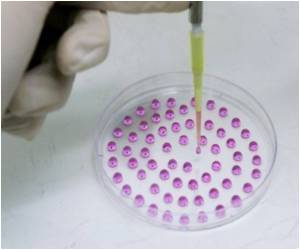
"Basically, we've helped the cells be 'invisible' to the body's natural killer cells, T cells and other aspects of the immune system, so they can survive to promote healing," said Graca Almeida-Porada, M.D., Ph.D., senior author and professor of regenerative medicine at Wake Forest Baptist.
The research, reported in the current issue of PLOS One, a peer-reviewed, open access journal, involves mesenchymal stem cells (MSCs), found in bone marrow, peripheral and cord blood and fetal liver and lung tissue. These cells are known for their ability to migrate to damaged tissues and contribute to healing. However, like all cells, they are susceptible to being killed by the body's complement system, a part of the immune system involved in inflammation and organ rejection.
"These cells have a natural ability to help modulate the immune response, so if we can increase their survival, they theoretically could be a therapy to decrease inflammation and help transplant patients avoid organ rejection," said Almeida-Porada.
In the study, the researchers evaluated the potential of human cytomegalovirus (HCMV), a member of the herpes virus family, to help increase the survival of MSCs. While the HCMN virus infects between 50 percent and 80 percent of people in the U.S., it normally produces no symptoms and remains latent in the body over long periods.
"We wanted to take advantage of the virus' ability to evade the immune system," said Almeida-Porada. "Our strategy was to modify the cells to produce the same proteins as the HCMV virus so they could escape death and help modulate inflammation and promote healing."
Advertisement
"The research showed that modifying the cells indeed improves their survival," said Almeida-Porada. "Next, we hope to evaluate the healing potential of these cells in conditions such as bowel disease, traumatic brain injury and human organ transplant."
Advertisement











